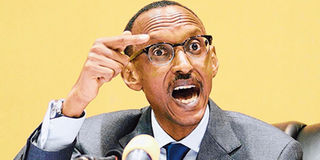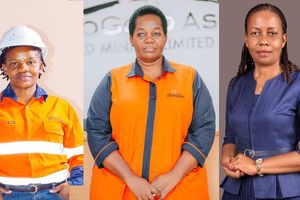Burundi members snub Eala as Kagame plays down feud

Rwandan President Paul Kagame
What you need to know:
The Rwandan leader said his country’s political will for regional integration was “stronger than ever before” in his address to the Eala session, which started with Burundi MPs from the ruling CNDD-FDD party conspicuously absent.
Kigali. President Paul Kagame of Rwanda steered clear of discussing sour relations with neighbouring Burundi yesterday in his address to the East African Legislative Assembly (Eala) even as five lawmakers from Burundi’s ruling party boycotted the opening ceremony of the Kigali sitting.
The Rwandan leader said his country’s political will for regional integration was “stronger than ever before” in his address to the Eala session, which started with Burundi MPs from the ruling CNDD-FDD party conspicuously absent.
The five MPs had earlier in their letter to the Speaker in January this year threatened they would not attend the sitting in the Rwandan capital fearing for their security because of the deteriorating relations between the two partner states of the East African Community (EAC).
Ever since the threat was made nearly two months ago, the Parliament has declined to comment on the matter. But yesterday the Speaker, Mr Daniel Kidega, told reporters that in response to their fears, they had requested for beefed-up security for Eala members currently in Kigali.
“As we are talking now we are not aware if the said MPs are on the way to Kigali or not,” he told journalists during a media briefing that followed President Kagame’s opening address.
Journalists and other stakeholders had pressed on the Eala Speaker to clarify on the fate of absent Burundi MPs, warning that it was wrong to take it for granted simply because only three lawmakers from each partner state make a quorum for the House business to proceed uninterrupted.
Mr Kidega insisted that although this was not the first time his office had received security concerns from the legislators, the House would strictly adhere to the laid down procedures in conducting its business, and that this included the issue of quorum.
“The current session is fully constituted because we have a minimum of three members from each partner state to continue with the business,” he said, adding that if they did not turn up at all, the Parliament could consider what measures to take for what could be considered sheer absenteesim.
The five legislators from Burundi who were not at the Rwanda Parliament buildings for the commencement of the Eala session are Ms Emerence Bucumi, Ms Isabelle Ndahayo, Mr Jean Marie Muhirwa, Mr Emmanuel Nengo and Mr Leonce Ndarubagiye.
The three told reporters in Arusha early last month that they were going to snub the Parliament sitting in Kigali in protest against the sidelining of Burundi by the EAC and its organs, such as Eala, in hosting the regional body’s activities.
The country was until last year rocked by deadly political violence.
There had been few major activities organised by the EAC in Burundi since the failed coup in May 2015, and the announcement by President Pierre Nkurunziza to extend his tenure a month earlier.
These plunged the country into violence pitting the security forces and protestors mainly in the capital, leading to the deaths of over 500 people to date and over 300,000 fleeing to neighbouring countries as refugees.
Regional analysts, however, believe the MPs’ snub was sparked by the deteriorating relations between Burundi and its northern neighbour Rwanda. Bujumbura has accused Kigali of supporting the armed groups bent on overthrowing President Nkurunziza’s government. Rwanda has repeatedly denied the claims.
Impeccable sources at Eala said the Eala members from Burundi, who feared for their lives, had wanted the session currently taking place in the Rwanda capital to be relocated to Arusha, the EAC headquarters.
But in an interview with The Citizen yesterday, a Tanzanian member to the regional Parliament, Mr Charles Makongoro Nyerere, said a special commission set up to investigate the claims that the lives of Burundian politicians could be threatened in Rwanda found no evidence to support them. “There is no evidence of their security threatened. And this matter did not come from their government but individual MPs,” he said, adding that Rwandan authorities had promised to provide enough protection for all MPs while they were in Kigali.
Four opposition MPs from Burundi who attended the opening session of the Parliament in Kigali yesterday, appeared to go on about their duties unperturbed.
One of them, Yves Nsabimana from the Frodebu party, declined to explain in detail the saga, saying the decision to boycott the Eala session may have been taken by the five MPs on an individual basis.
The others are Jeremie Ngendakumana, a former leader of the ruling CNDD-FDD, Dr Martin Nduwimana from Uprona party and Frederic Ngenzebuhoro from the same political party.
The Eala crisis over the Burundian MPs began in late 2015 when the government announced a plan to withdraw the very four members of the opposition parties from the regional House on grounds that they were siding with forces against President Nkurunziza’s extension of tenure.
The move was vehemently opposed by Eala, which termed it unlawful and an affront to the principles under the Treaty for the Establishment of the East African Community (EAC).




